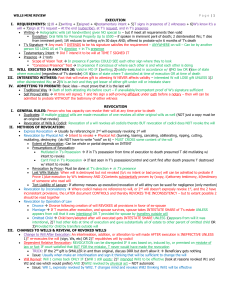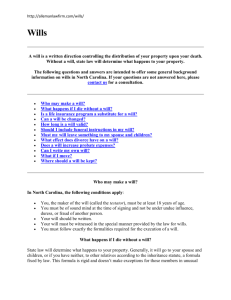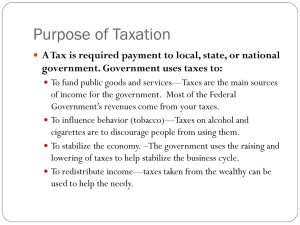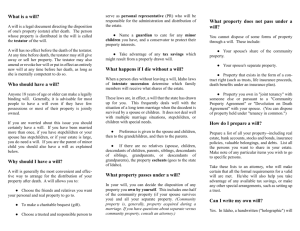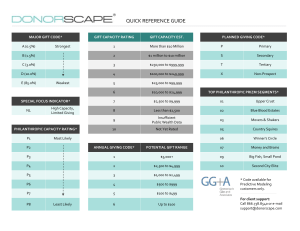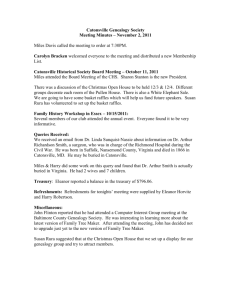Wills Outline
advertisement
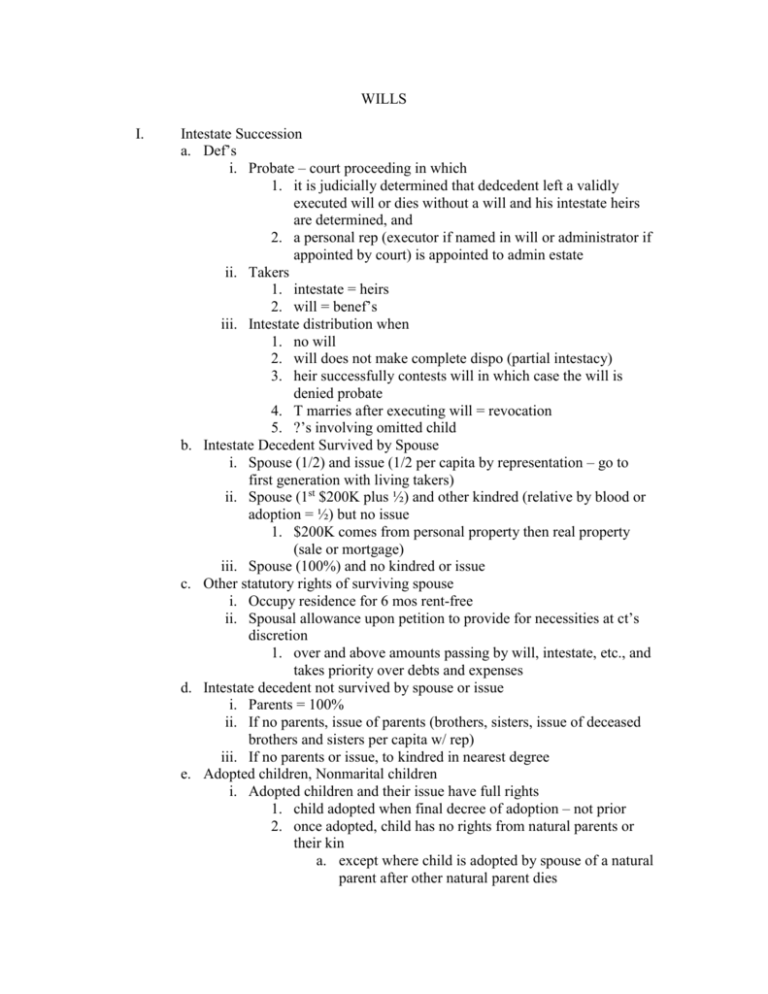
WILLS I. Intestate Succession a. Def’s i. Probate – court proceeding in which 1. it is judicially determined that dedcedent left a validly executed will or dies without a will and his intestate heirs are determined, and 2. a personal rep (executor if named in will or administrator if appointed by court) is appointed to admin estate ii. Takers 1. intestate = heirs 2. will = benef’s iii. Intestate distribution when 1. no will 2. will does not make complete dispo (partial intestacy) 3. heir successfully contests will in which case the will is denied probate 4. T marries after executing will = revocation 5. ?’s involving omitted child b. Intestate Decedent Survived by Spouse i. Spouse (1/2) and issue (1/2 per capita by representation – go to first generation with living takers) ii. Spouse (1st $200K plus ½) and other kindred (relative by blood or adoption = ½) but no issue 1. $200K comes from personal property then real property (sale or mortgage) iii. Spouse (100%) and no kindred or issue c. Other statutory rights of surviving spouse i. Occupy residence for 6 mos rent-free ii. Spousal allowance upon petition to provide for necessities at ct’s discretion 1. over and above amounts passing by will, intestate, etc., and takes priority over debts and expenses d. Intestate decedent not survived by spouse or issue i. Parents = 100% ii. If no parents, issue of parents (brothers, sisters, issue of deceased brothers and sisters per capita w/ rep) iii. If no parents or issue, to kindred in nearest degree e. Adopted children, Nonmarital children i. Adopted children and their issue have full rights 1. child adopted when final decree of adoption – not prior 2. once adopted, child has no rights from natural parents or their kin a. except where child is adopted by spouse of a natural parent after other natural parent dies II. ii. nonmarital child 1. full inheritance rights from mother 2. none from father unless a. mother and father married after child’s birth and father acknowledges paternity, or b. paternity was established in paternity suit, or c. paternity established in probate challenge in action commenced w/in one year after decedent’s death iii. adoption by estoppel (equitable adoption) – when one promises to adopt a child but never follows through 1. promise can be implied iv. posthumously conceived child can inherit if 1. decedent consented to posthumous conception 2. consented to support child 3. prompt and orderly admin of estate is not compromised f. Simultaneous death i. USDA – if no suff evidence (even 5 minutes survival will work) of order of death, property passes as though each survived the other 1. JTROS becomes T/C g. Lifetime gifts i. Lifetime gift is not an advancement unless declared as such in writing (must be writing) 1. contemporaneous (at the same time as the gift) by donor, or 2. acknowledged as such in writing by donee ii. Otherwise, add gift back to estate, divide by number of takers, then reduce donee’s share by value of gift h. Disclaiming i. To be valid, 1. in writing 2. signed 3. recorded w/ probate ct w/in 9 mos of dec’s death (or 9 mos after IV trust created) a. if real prop, acknowledged by notary and recorded ii. once disclaimed, irrevocable iii. can be partial disclaimer iv. disposition as though disclaimant predeceased decedent v. can NEVER be used to screw creditors’ claims if disclaimant is insolvent Execution of wills a. Req’s i. 18 years old ii. signed by T (or someone at T’s direction and in her presence – proxy) 1. sig anywhere on will – need not be at end 2. as long at sig was T’s own volition 3. any mark intended as T’s sig will suffice III. iii. two attesting witnesses 1. no age req’s but must have sufficient understanding 2. w’s need not sign in each other’s presence iv. T must sign will (or acknowledge earlier sig) in presence of each W 1. line of sight okay v. Each W must sign in T’s presence b. Interested witness statute i. W may be both a benef and W to will BUT he loses his legacy unless there were two disinterested attesting w’s – supernumerary rule 1. w’s wife implicates statute but not daughter 2. contingent benef’s do NOT implicate statute ii. executor may be paid for services w/o implicating statute b/c only applies to beneficial gifts – not compensation c. Holographic and oral wills i. No holographic wills in Mass ii. Oral wills only for active soldiers and mariners at sea 1. only for pers prop iii. Uniform Execution of Foreign Wills Act 1. Mass will admit wills executed in other states if a. Executed IAW Mass law b. Law of place where will was executed c. Law of place where T domiciled either when will was signed or at her death Revocation of Wills a. Valid revocation only by i. Later test instrument executed w/ appropriate formalities ii. Physical act iii. Operation of law b. M/b on the will itself – no copy c. Proxy revocation valid only if made by another person i. At T’s direction, and ii. In T’s presence d. Probating lost wills IAW Proof of Lost Wills i. Proof of due execution ii. Cause of will’s nonproduction must be proved iii. Contents m/b proved by secondary evid 1. oral testimony m/b strong, positive, and free from doubt = persuasive e. Presumptions of revocation i. Last seen in T’s possession = revoc by physical act 1. either not found or found mutilated ii. last seen in poss of someone adversely affected by will = not presumed revoked iii. evid is admiss to rebut prempt IV. iv. if executed in two originals, T’s destroying only one is sufficient f. two wills i. if second will does not contain revoking language, read both wills together 1. revocation to the extent of inconsistent provisions ii. if wholly inconsistent, first will revoked by implication iii. revoking codicil does not revoke will – just restores that part of will modified by codicil g. Revival i. In Mass, a revoked will is not revived unless 1. the will is still in existence, and 2. evidence that T intended to revive h. Dependent Relative Revocation i. Legal fiction where … ii. Only applied when distrib that results from disregarding the revocation comes closer to doing what the T tried to do but failed than an intestate distrib – not to defeat T’s intent i. Changes on face after will has been executed i. Partial revocation by crossing out a section of the writing is valid ii. No crossing out an amount and writing in another amount 1. although crossing out the amount is a valid revocation and the “new” amount is not valid, the original crossed-out amount remains valid under DRR iii. if name of benef crossed out and replaced with another name, neither benef take b/c it was clear that T wanted to get rid of original name but writing in second name is invalid 1. DRR does not save the original taker Benef dies during T’s lifetime a. Anti-Lapse i. When will benef predeceases T, the gift lapses unless saved by ALS ii. Mass ALS applies if predeceasing benef was a child or other relative by blood or marriage iii. When gift lapses or taker by ALS, what was actually written in the will is irrelevant 1. look out for “to son S if he survives me” b/c ALS would not apply b/c gift fails according to these terms b. Lapse in residuary gift i. If residuary estate is devised to two or more persons and gift to one of them lapses, surviving residuary benef’s take the entire residuary estate, in proportion to their interests in the residue 1. make sure to apply ALS to deceased residuary benef in order to determine whether his issue takes his share or whether ALS does not apply b/c of lack of blood/adoption relation req c. Class gifts V. i. In a gift by will to a class of persons (children, brothers and sisters), if a class member predeases T, surviving class members take 1. why? T was “group-minded” 2. again, check to see if ALS applies ii. BIG difference if will names individuals – “in equal shares to A, B, and C, the children of my friend Joe” 1. class gift rule does not apply 2. deceased benef’s share falls into residuary estate a. unless, of course, ALS applies iii. Rule of Convenience (“class closing rule”) 1. class is closed, meaning later-born class members do not share gift, when some class member is entitled to distrib a. class closes at T’s death subject to 280 days gestation principle Changes in family relations after will’s execution a. T marries after execution i. Revoked in entirety 1. except for provision exercising power of appointment ii. unless it appears from the will that it was made in contemplation of marriage iii. look out for republication (by codicl) AFTER marriage – saves will b/c will “speaks” as of the date of republication b. T divorced after execution i. Divorce or annulment REVOKES all gifts and fiduciary appointments in favor of former spouse 1. Estate is distrib, fiduciaries named as though former spouse predeceased T ii. Reconcile and remarry puts things back as they were as though never divorced 1. decree of separation does NOT revoke – only divorce decree iii. does NOT apply to 1. life insurance 2. i/v trusts a. unfunded revocable trusts to be funded at T’s death in favor of former spouse ARE revoked b/c funding done through will iv. JTROS becomes T/C c. Omitted Child Statute i. OCS applies to all children and the issue of deceased children whether alive when will executed or born or adopted thereafter ii. Omitted child takes intestate share and the remainder distrib per will iii. OCS does not apply if evidence shows omission was 1. intentional, or VI. 2. child was provided for during T’s lifetime (i/v trust) iv. OCS applies only to probate estate 1. therefore, does not apply to revocable trust v. children born out of wedlock PRESUMPTIVELY covered under OCS if child would take if 1. mother and father married after child’s birth and father acknowledges paternity, or 2. paternity was established in paternity suit, or 3. paternity established in probate challenge in action commenced w/in one year after decedent’s death Problems associated w/ testamentary gifts a. Types of gifts i. Specific – “Blackacre to my son John” ii. Demonstrative - $25K to be paid from the proceeds of the sale of my Shell stock” iii. General – “$10K to my nephew John” iv. Residuary – “all the rest and residue of my estate to my cousin Betty” v. Intestate – no intestacy clause results in partial intestacy b. Abatement to pay debts and expenses i. Absent contrary provision, debts and expenses are first paid out of 1. intestate property 2. residuary 3. general and demonstrative 4. specific ii. w/ no distinction between real or personal property iii. EXCEPTION – gifts to spouse and minor children are the last to abate even if it is a residuary gift c. Specifically devised property not in estate at death – ademption by extinction i. Nothing to take – no substitution ii. Exception – if specific devised prop sold by guardian or conservator, benef is entitled to proceeds of sale if traceable in the estate at T’s death 1. why? – b/c was not T’s intent to change gift or sell prop iii. applies at moment T enters sales agreement with buyer – equitable conversion iv. only applies to specific gifts d. Bequest of stock i. “I give my 100 shares of IBM…” = specific gift ii. “I give 100 shares of …” = demonstrative gift = general = date of death value of stock to benef iii. specific gift of stock includes 1. additional stock of that entity or another entity produced by the stock split 2. stock dividend VII. VIII. 3. stock resulting from merger, reorganization, etc 4. but NOT stock acquired by exercise of stock option (m/b outside of T’s control) e. Specific gifts of property subject to liens i. NO exoneration of liens unless will directs exoneration Reference to acts and events outside will a. Incorp by reference i. An extrinsic document, not present when the will was executed and thus not part of the duly executed will, can be incorporated by reference into the will if 1. writing must be in existence when the will was executed 2. will must show intent to incorporate the writing 3. will must describe the writing sufficiently to permit its id – so there is no mistake that the doc is what the will refers to ii. Exception – existing doc that makes gifts of tangible peers prop can be altered at any time b. Acts of Ind Signif (doctrine of nontest acts) i. M/b a lifetime act w/ a lifetime purpose ii. Of tangible prop and cash 1. Excludes title docs (deeds, bank book, stock cert) Other Will Doctrines a. Mistake or ambiguities in the will i. Plain meaning rule – w/no ambiguity, extrinsic evidence inadmissible (unnecessary b/c the words are clear on their face) 1. absent suspicious circ’s, it is conclusively presumed that T read will and intended its contents ii. Latent ambiguity – misdescription 1. “I give $10 to my nephew John Paul Jones” but have a nephew James Peter Jones and one Harold Paul Jones 2. extrinsic evidence allowed to cure ambiguity in order to find meaning of words T used 3. if still unable to cure ambiguity, gift fails b/c no ascertainable benef’s iii. Patent ambiguity 1. I give Bob twenty-five dollars ($25,000). 2. Old Mass case law says no extrinsic evid – give lesser amount – but modern trned is to permit it iv. Blank lines in will 1. ct will not fill in blanks in a will v. Mistake in the inducement 1. erroneous belief as to some fact that causes T to make (or not make) certain acts in her will (falsely believing Mary is wealthy and therefore excluding her from will when in fact she is broke) 2. absent fraud, no relief vi. Fraud in the inducement IX. 1. another person mislead T and T relied on misinformation to take certain action with her will (B told Mom that A won the lottery when in fact she did not) 2. impose constructive trust in favor of benef that suffered as a result of misleading b. Contracts relating to wills i. SOF applies – promise must be in writing and signed by obligor 1. obligee might have Contract action – quantum meruit (reasonable value for services rendered if services performed w/ reasonable expectation of payment) c. Words of disinheritance i. Ineffective IF will does not make complete disposition of estate (partial intestacy) b/c intestacy passes per statute, not per will d. Atty liability for negligence i. Atty’s duty is to trustee who retained him – not to benef’s ii. Under will, 1. old view that atty duty to (dead) client 2. modern view – atty has duty to intended benef’s as well 3. in Mass, argue both and conclude ct likely to adopt modern view Elective Share a. How much does surv spouse get i. Spouse w/ dec’s issue = first $25K of pers prop + life estate in 1/3 balance ii. Spouse w/ dec’s kindred but NOT issue = first $25K + life estate in ½ balance iii. Spouse only = first $25K + ½ balance outright iv. EXAM Tip – in any question involving surviving spouse, strengthen answer by mentioning elective share statute b. Trusts i. Revoc trusts created or additions made on or after 01-23-1984 are subject to elective share ii. Totten Trusts subject to elective share b/c they are revocable c. Life insurance – not subject to elect share d. Other points i. Dec m/b Mass domiciliary ii. Elect share applies to pers prop wherever located and Mass only real property iii. Sp must file election w/in 6 mos after will admitted to probate or conclusive presumption that she will take under will iv. Spouse must make while alive 1. except guardian or conservator w/ ct permission v. Abatement rules apply to satisfying sp’s elective share 1. BUT prop devised to spouse by will is first applied vi. Right may be waived in a written contract as long as supported by consideration X. XI. vii. Surv sps disqualified if she deserted dec or if couple living apart for justifiable cause e. Dower i. Elective share in dec’s real prop ONLY owned at death ii. Benefit – takes precedence over creditor’s claims – unlike prop passing by will, intestacy, or elect share Will Contests a. Who can contest? i. Only interested parties – person w/ economic interest that would be adversely affected by will’s probate ii. Not creditors b. Lack of test capacity i. Burden on contestant ii. Sufficient capacity (AT the time he makes will!) 1. understands the nature of the act he was doing 2. knows the nature and approx value of his prop 3. knows the nature of his bounty 4. understands the disposition he is making iii. look for hypo where T was adjudicated incapacitated for another purpose (admiss as evidence only) and distinguish legal test for that capacity from capacity to make will (lucid interval) c. Undue influence i. Existence of a test capacity subjected to and controlled by a dominant influence of power 1. existence and exertion of the influence 2. effect is to over power mind and will of T 3. actually produced a will that would not have been made but for the influence ii. may be shown on the entire will or just a part of it (one gift) iii. circumstantial evid alone is not enough (but all of them at the same time might be) 1. mere opportunity to exert infl 2. mere susceptibility to influence 3. mere fact of unnatural dispo iv. where fiduciary relationship, undue infl presumed 1. fid has burden to prove a. T made will with full knowledge and intent, or b. Had ind counsel d. No Contest Clause i. In Mass., given full effect = forfeiture! ii. If contestant wins, there is no no-contest clause b/c there is no will to probate e. Tortious interference w/ inheritance i. NOT in Mass ii. Maybe some other remedies but under Wills Estate Administration a. SOL – all claims m/b filed w/in one year after dec’s death i. Exceptions: 1. new assets discovered 2. action on the claim accrued more than one year after dec’s death 3. claim was covered by insurance 4. where justice and equity require b. sale of r/e must be w/ ct approval unless power of sale was granted by will

